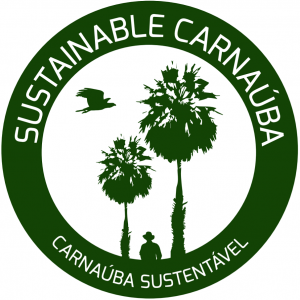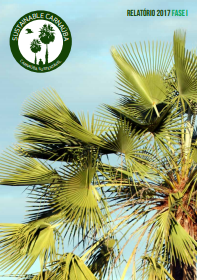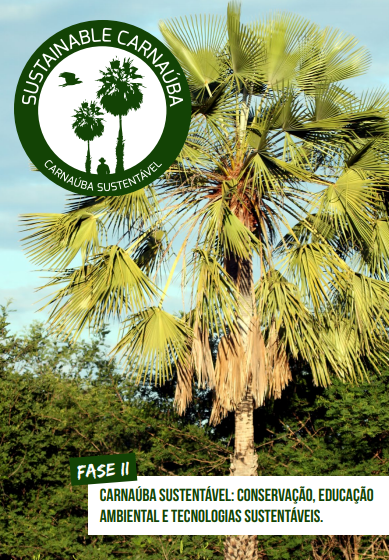Sustainable Carnauba Project
[ conservation, education and sustainable technologies ]
The culture of the carnauba palm tree is, by excellence, an example that it is possible to boost an economy while preserving the environment and valuing the life of people. A virtuous circle that wholly respects economic, ecological and social precepts of sustainability.
From the ecological standpoint, no stage of the possible processes for the use of the natural resources in carnaúba extraction involve non-renewable agressions to the environment. Quite the opposite. Cutting the tree crown, besides not being harmful, helps to delay the palm trees ageing process. The drying of the palm leaves is carried out using sunlight. In the extraction of the carnauba powder, the waste of the straw is converted into organic fertilizer. In addition, the trunk of the carnauba tree can be used in the construction of rural buildings; the whole leaf, is often used as roofing for dwellings and in arts and crafts; the ground leaf, after the powder has been collected, is used for humidity retention and soil coverage.
From the social point of view, the culture of carnaúba is an important source of jobs and income for a very large part of the labor force in a period of the year that is usually critical in the semiarid northeastern region. The harvesting of carnaúba takes place between July to December, a time when there is a huge drop in family farming production in the region due to low rainfall levels (the drought). This factor makes this activity essential in keeping the rural workers in the fields, as well as helps them thrive as productive citizens since it gives them a job and income and offers dignity for hundreds of thousands of rural workers.


From the economic standpoint, the culture of carnauba involves a rich and diverse productive chain that extends from the most rudimentary production of artisanal goods to cutting-edge applications in the technological sector with a strong presence in the areas of chemicals, pharmaceuticals, food products, cosmetics, tires, printing, automobiles, aeronautics, packaging, cleaning materials, oil and gas and information technology. The physical-chemical properties of the Carnauba Wax and the fiber add a strong competitive differential to the products that use them in their composition because they eliminate the need for synthetics. It is not by chance that carnauba has, for a very long time, been one of the most relevant items in the export agenda of the producing states, particularly Ceará and Piauí state and contributes significantly to the trade balance of these regions.
However, over the years, the carnaúba extraction industry has had to overcome challenges that transcend its operational relevance. Problems that go from the deforestation of carnaúba plantations for the development of other cultures, infestations of invasive vines, such as the Cryptostegia madagascariensis, responsible for the progressive death of the palm tree. There are also challenges of a social/economic nature that involve matters linked to work relations in the extraction activity itself, as well as in terms of the enforcement of a tax burden that pressures and compromises the competitive edge of the business.
Based on this scenario, it has become imperative to strengthen all the links and ensure sustainability throughout the productive chain of the Carnaúba. It was with this in minde that the Syndicate of the Carnauba Wax Refinery Industry of Ceará State ( Sindicato das Indústrias Refinadoras de Cera de Carnaúba do Ceará – SINDCARNAÚBA) decided to create the “SUSTAINABLE CARNAÚBA SEAL.”
Developed in partnership with ASSOCIAÇÃO CAATINGA, a non-governmental organization whose mission is to “promote the conservation of land, forests and waters of the Caatinga scrubland region to ensure the permanence of all of its lifeforms,” the seal integrates a greater action, the project dubbed “SUSTAINABLE CARNAÚBA – CONSERVATION, EDUCATION AND SUSTAINABLE TECHNOLOGIES”, that compromises the signatory companies that aim to effectively contribute towards the conservation of the Caatinga scrubland region and social investments in sustainability in the productive chain of Carnaúba.

By grant of SINDCARNAÚBA and with the seal of ASSOCIAÇÃO CAATINGA, the companies that subscribe to the letter of principles and have formalized a direct link with the Sustainable Carnaúba project, receive a CERTIFICATE that confirms they can use the SUSTAINABLE CARNAÚBA SEAL.
The only companies that are part of the project are those who are syndicated and agree to invest in the sustainability of the productive chain of Carnaúba, work towards the development and protection of Carnaúba plantations; respect all the regulating standards of the sector, maintain an ethical and valued relationship with workers and are completely against any type of labor practice that exploits children or is similar to slavery.
The syndicated companies, who are part of the project also agree, through the Sustainable Carnaúba project, to encourage the appropriation of sustainable technologies as tools to improve life in the semiarid region, for the rational use of natural resources and to increase capital; and to promote actions of environmental education and institutional communication, with the purpose of making the population as a whole more aware of the need to preserve the Caatinga and the culture of Carnaúba.
By adding the CARNAÚBA SUSTENTÁVEL SEAL in their communication tools, the certified companies confirm to be the holders of a portfolio of products and services that, by excellence, integrate the virtuous cycle of the Carnaúba tree, respecting, therefore, all precepts of economic, ecological and social sustainability.
Fortaleza, Setembro de 2016
Edgar Gadelha
CEO of SINDCARNAÚBA


